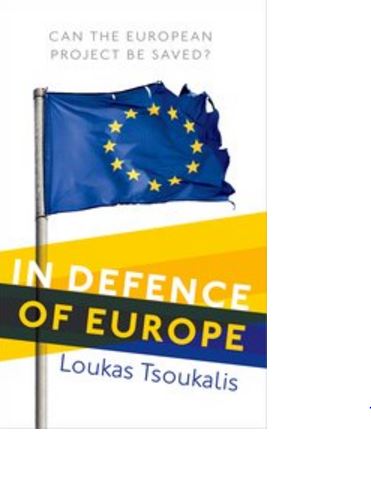Vivien Schmidt, (2016), “Missing Topic In #EUref: Neo-Liberalism Gone Too Far”, Social Europe, 22 June As the referendum campaign nears its end, one central issue is remarkable for its absence, despite the fact that it has been a major contributor to the anger that lends support to the Brexit camp: neo-liberalism. The revolt against the political parties, the rejection of the experts, the distrust of the elites more generally: all …Read More
A New Economic Paradigm To Fight Populism
Thomas Fricke, (2016), “A New Economic Paradigm To Fight Populism”, Social Europe, 21 June If the polls tell the truth, 86 percent of the Austrian blue-collar workers voted for the right-wing populist Norbert Hofer in the Austrian presidential elections in May. In the presidential elections in France Marine Le Pen would have reached the final round already back in 2012, had it been up to the blue-collar workers. In the …Read More
Europe’s Wake-Up Call
Merritt, Giles, (2016), “Europe’s Wake-Up Call”, Project Syndicate, 20 June There’s a silver lining to the dark clouds of populist Euroskepticism crowding in on the European Union. In Brussels and a number of Europe’s capitals, leaders know that the EU must respond to mounting discontent, and that – at long last – there is political capital to be gained in doing so. Relevant Posts Balfour, Rosa, Emmanouilidis, Janis A., Fieschi, Catherine, et al., (2016), “EUROPE’S TROUBLEMAKERS …Read More
Employment and wage insurance within firms: Worldwide evidence
Ellul, Andrew, Pagano, Marco, Schivardi, Fabiano, (2016), ” Employment and wage insurance within firms: Worldwide evidence “, Voxeu, 17 June Most countries feature some form of government-provided unemployment insurance, but there is an alternative provider of insurance for employees – the firm they work for. This column asks whether the provision of implicit insurance by family firms in particular to employees is a substitute for the provision of explicit insurance by governments. Family …Read More
Ιn Defense of Europe. Can the European project be saved?
Tsoukalis, Loukas, (2016), “Ιn Defense of Europe. Can the European project be saved?”, Oxford University Press Το νέο βιβλίο του Προέδρου του ΕΛΙΑΜΕΠ, Καθηγητή Λουκά Τσούκαλη: Ιn Defense of Europe. Can the European project be saved? εκδίδεται από τον οίκο Oxford University Press. Για πολλά χρόνια η Ευρώπη δεν ήταν τόσο αδύναμη και διχασμένη, όπως συμβαίνει σήμερα. Τραυματισμένη από διαδοχικές κρίσεις, έχει δείξει ισχυρό συλλογικό ένστικτο επιβίωσης αλλά δεν έχει ανταποκριθεί …Read More
Germany’s world: power and followership in a crisis-ridden Europe
Hellmann, Gunther, (2016), “Germany’s world: power and followership in a crisis-ridden Europe”, Global Affairs, Volume 2 Issue 1, 11 Μay EUrope and Germany face unprecedented crises. Given its role as EUrope’s “central power” the article explores how Germany looks at its environment and how the world looks back. I offer five cuts of Germany’s world, that is, how its power, place and ambition might be described from different angles. First, I …Read More
Why the Eurozone can’t agree on convergence. And how structural reforms can help
Anna auf dem Brinke, Henrik Enderlein, Jörg Haas, (2016), “Why the Eurozone can’t agree on convergence. And how structural reforms can help”, Jacques Delors Institut Policy Paper 165, 24 May It is common sense that the euro area needs more convergence to work as intended. At the same time, we lack a common definition. There are two important types of convergence that can both lead to a better functioning European Economic …Read More
What those calling for Brexit could learn from the Greek bailout referendum
Featherstone, Kevin, (2016), “What those calling for Brexit could learn from the Greek bailout referendum”, LSE Europpblog, 6 June In the summer of 2015, Greece held a referendum on a proposed bailout deal, with the electorate decisively rejecting the proposal. Kevin Featherstone writes that much like the upcoming referendum on the UK’s membership of the EU, the referendum in Greece was accompanied by the rise of populist campaigning in which emotional appeals …Read More
Good skills in bad times: Cyclical skill mismatch and the long-term effects of graduating in a recession
Kai Liua, Kjell G. Salvanes, Erik Ø. Sørensen, (2016), “Good skills in bad times: Cyclical skill mismatch and the long-term effects of graduating in a recession”, European Economic Review, Volume 84, May We show that cyclical skill mismatch, defined as mismatch between the skills supplied by college graduates and skills demanded by hiring industries, is an important mechanism behind persistent career loss from graduating in recessions. Using Norwegian data, we find a strong …Read More
Voter Turnout in European Parliament Elections: A Spatial Analysis
Nadia Fiorino, Nicola Pontarollo, Roberto Ricciuti, (2016), “Voter Turnout in European Parliament Elections: A Spatial Analysis”, CESifo Working Paper No. 5910, May In European Parliament elections turnout rates, traditionally lower than in national parliamentary elections, decrease from one elections to the next, and show strong variations within and between countries. What explains this decline? Why are there such big differences between and within the EU member countries? This paper investigates these problems …Read More





